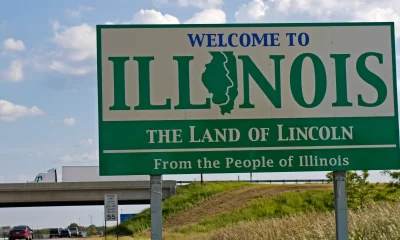Business
Maryland Governor Approves Bills on Cannabis Reform, Abortion Protection, Gender-Affirming Treatment

The six bills form a cohesive wellness package meant to make Maryland a healthier place.
Maryland Governor Wes Moore signed six new bills into law on Wednesday, CBS News reports. The bills, in a win for social liberals across the state and country, collectively cover protections for gender-affirming health care, abortion, and cannabis reform. Let’s start by reviewing the cannabis legislation.
Back in November, Maryland voters approved an amendment to the state’s constitution to allow adults 21 and older to possess up to 1.5 ounces of cannabis legally. 67% of adults voted in favor of the bill, which creates the licensing and tax rates. The tax rate for adult use in Maryland will be 9%.
Legalization is always wonderful, considering it means fewer people in prison. However, looking at mass legal cannabis exoduses from other states such as California, thanks to the red tape, expenses, and hurdles of setting up legally, such bills also admittingly make one think that sometimes the industry legal cannabis helps the most is the black market.
Recreational cannabis sets up shop in Maryland starting on July 1. The existing medical cannabis dispensaries will receive dual licenses to enter the adult-use market. In addition, in an effort to make amends for the racist casualties of the War on Drugs, priority for additional recreational licenses will be given to minority business owners in communities that have been negatively affected by past marijuana laws. As data from the ACLU shows, despite equal usage rates, Black people are 3.73 times more likely than whites to be arrested for marijuana. “This will ensure the rollout of recreational cannabis in our state drives opportunity in an equitable way,” Gov. Moore said. “The criminalization of marijuana harmed low-income communities and communities of color in a profound way. We want to make sure the legalization of marijuana lifts those communities now in a profound way.”
Earlier this week, Gov. Moore shut down concerns about his conflicts of interest. He had roughly $1.2 million of stock in a cannabis company, which was transferred into a blind trust managed by Brown Investment Advisory & Trust Company and approved by The State Ethics Commission last week.
Regarding the other bills signed into effect, two measures intend to expand access to affordable health insurance. One will automatically enroll folks into Medicaid who are eligible but not yet signed up in an effort to reduce paperwork and give insurance to an estimated 65,000 uninsured Marylanders. Another bill includes a package of mental health care that aims to get folks help before their mental health concerns become an emergency, such as setting up a suicide and crisis prevention hotline.
Regarding abortion, in light of Roe v. Wade being overturned, one Maryland bill aims to protect patients and providers from criminal, civil, and administrative penalties relating to abortion bans or restrictions in other states, CBS reports. Another is a data-privacy bill that protects medical and insurance records in electronic health information sharing. Additionally, Gov. Moore signed a bill to ensure that Maryland’s public colleges and universities have a viable plan to give students easy access to emergency contraception and medical abortion (abortion pills).
Because of restrictive abortion laws in other states, Maryland is becoming a “safe haven state” where people travel to obtain reproductive care unavailable in their hometown.
And as for gender-affirming health care, one of the six bills regards The Trans Health Equity Act and expands on how many gender-affirming procedures will be covered by Maryland’s Medicaid program. Under the legislation, which goes into effect on January 1, Medicaid will cover additional gender-affirming treatments.
All of the six bills, from cannabis to gender-affirming health care, tie together in a cohesive wellness package. For example, research shows that access to gender-affirming care reduces suicide rates, so ideally, all six bills will make Maryland a safer and healthier place for its residents.
Business
New Mexico cannabis operator fined, loses license for alleged BioTrack fraud

New Mexico regulators fined a cannabis operator nearly $300,000 and revoked its license after the company allegedly created fake reports in the state’s traceability software.
The New Mexico Cannabis Control Division (CCD) accused marijuana manufacturer and retailer Golden Roots of 11 violations, according to Albuquerque Business First.
Golden Roots operates the The Cannabis Revolution Dispensary.
The majority of the violations are related to the Albuquerque company’s improper use of BioTrack, which has been New Mexico’s track-and-trace vendor since 2015.
The CCD alleges Golden Roots reported marijuana production only two months after it had received its vertically integrated license, according to Albuquerque Business First.
Because cannabis takes longer than two months to be cultivated, the CCD was suspicious of the report.
After inspecting the company’s premises, the CCD alleged Golden Roots reported cultivation, transportation and sales in BioTrack but wasn’t able to provide officers who inspected the site evidence that the operator was cultivating cannabis.
In April, the CCD revoked Golden Roots’ license and issued a $10,000 fine, according to the news outlet.
The company requested a hearing, which the regulator scheduled for Sept. 1.
At the hearing, the CCD testified that the company’s dried-cannabis weights in BioTrack were suspicious because they didn’t seem to accurately reflect how much weight marijuana loses as it dries.
Company employees also poorly accounted for why they were making adjustments in the system of up to 24 pounds of cannabis, making comments such as “bad” or “mistake” in the software, Albuquerque Business First reported.
Golden Roots was fined $298,972.05 – the amount regulators allege the company made selling products that weren’t properly accounted for in BioTrack.
The CCD has been cracking down on cannabis operators accused of selling products procured from out-of-state or not grown legally:
- Regulators alleged in August that Albuquerque dispensary Sawmill Sweet Leaf sold out-of-state products and didn’t have a license for extraction.
- Paradise Exotics Distro lost its license in July after regulators alleged the company sold products made in California.
Golden Roots was the first alleged rulebreaker in New Mexico to be asked to pay a large fine.
Source: https://mjbizdaily.com/new-mexico-cannabis-operator-fined-loses-license-for-alleged-biotrack-fraud/
Business
Marijuana companies suing US attorney general in federal prohibition challenge

Four marijuana companies, including a multistate operator, have filed a lawsuit against U.S. Attorney General Merrick Garland in which they allege the federal MJ prohibition under the Controlled Substances Act is no longer constitutional.
According to the complaint, filed Thursday in U.S. District Court in Massachusetts, retailer Canna Provisions, Treevit delivery service CEO Gyasi Sellers, cultivator Wiseacre Farm and MSO Verano Holdings Corp. are all harmed by “the federal government’s unconstitutional ban on cultivating, manufacturing, distributing, or possessing intrastate marijuana.”
Verano is headquartered in Chicago but has operations in Massachusetts; the other three operators are based in Massachusetts.
The lawsuit seeks a ruling that the “Controlled Substances Act is unconstitutional as applied to the intrastate cultivation, manufacture, possession, and distribution of marijuana pursuant to state law.”
The companies want the case to go before the U.S. Supreme Court.
They hired prominent law firm Boies Schiller Flexner to represent them.
The New York-based firm’s principal is David Boies, whose former clients include Microsoft, former presidential candidate Al Gore and Elizabeth Holmes’ disgraced startup Theranos.
Similar challenges to the federal Controlled Substances Act (CSA) have failed.
One such challenge led to a landmark Supreme Court decision in 2005.
In Gonzalez vs. Raich, the highest court in the United States ruled in a 6-3 decision that the commerce clause of the U.S. Constitution gave Congress the power to outlaw marijuana federally, even though state laws allow the cultivation and sale of cannabis.
In the 18 years since that ruling, 23 states and the District of Columbia have legalized adult-use marijuana and the federal government has allowed a multibillion-dollar cannabis industry to thrive.
Since both Congress and the U.S. Department of Justice, currently headed by Garland, have declined to intervene in state-licensed marijuana markets, the key facts that led to the Supreme Court’s 2005 ruling “no longer apply,” Boies said in a statement Thursday.
“The Supreme Court has since made clear that the federal government lacks the authority to regulate purely intrastate commerce,” Boies said.
“Moreover, the facts on which those precedents are based are no longer true.”
Verano President Darren Weiss said in a statement the company is “prepared to bring this case all the way to the Supreme Court in order to align federal law with how Congress has acted for years.”
While the Biden administration’s push to reschedule marijuana would help solve marijuana operators’ federal tax woes, neither rescheduling nor modest Congressional reforms such as the SAFER Banking Act “solve the fundamental issue,” Weiss added.
“The application of the CSA to lawful state-run cannabis business is an unconstitutional overreach on state sovereignty that has led to decades of harm, failed businesses, lost jobs, and unsafe working conditions.”
Business
Alabama to make another attempt Dec. 1 to award medical cannabis licenses

Alabama regulators are targeting Dec. 1 to award the first batch of medical cannabis business licenses after the agency’s first two attempts were scrapped because of scoring errors and litigation.
The first licenses will be awarded to individual cultivators, delivery providers, processors, dispensaries and state testing labs, according to the Alabama Medical Cannabis Commission (AMCC).
Then, on Dec. 12, the AMCC will award licenses for vertically integrated operations, a designation set primarily for multistate operators.
Licenses are expected to be handed out 28 days after they have been awarded, so MMJ production could begin in early January, according to the Alabama Daily News.
That means MMJ products could be available for patients around early March, an AMCC spokesperson told the media outlet.
Regulators initially awarded 21 business licenses in June, only to void them after applicants alleged inconsistencies with how the applications were scored.
Then, in August, the state awarded 24 different licenses – 19 went to June recipients – only to reverse themselves again and scratch those licenses after spurned applicants filed lawsuits.
A state judge dismissed a lawsuit filed by Chicago-based MSO Verano Holdings Corp., but another lawsuit is pending.
Source: https://mjbizdaily.com/alabama-plans-to-award-medical-cannabis-licenses-dec-1/
-

 Business2 years ago
Business2 years agoPot Odor Does Not Justify Probable Cause for Vehicle Searches, Minnesota Court Affirms
-

 Business2 years ago
Business2 years agoNew Mexico cannabis operator fined, loses license for alleged BioTrack fraud
-

 Business2 years ago
Business2 years agoAlabama to make another attempt Dec. 1 to award medical cannabis licenses
-

 Business2 years ago
Business2 years agoWashington State Pays Out $9.4 Million in Refunds Relating to Drug Convictions
-

 Business2 years ago
Business2 years agoMarijuana companies suing US attorney general in federal prohibition challenge
-

 Business2 years ago
Business2 years agoLegal Marijuana Handed A Nothing Burger From NY State
-

 Business2 years ago
Business2 years agoCan Cannabis Help Seasonal Depression
-

 Blogs2 years ago
Blogs2 years agoCannabis Art Is Flourishing On Etsy













